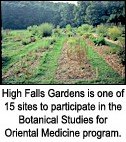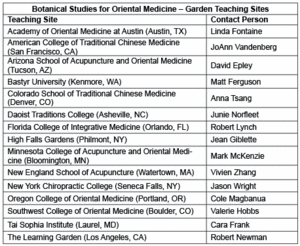The High Falls Garden Fund has been awarded a $200,000 grant from the W.K. Kellogg Foundation for a three-year program titled "Botanical Studies for Oriental Medicine." Building on the foundation of an earlier project, the purpose of the botanical studies program is to provide educational support for students and practitioners of Oriental medicine which, over time, will give them the ability to evaluate domestically grown herbs and to communicate more effectively with growers and manufacturers of herbal products.
"This new funding will help stu- dents of Oriental medicine get to know their herbs in context, including where they come from, how they are grown and who grows them," said Jean Giblette, who has directed High Falls Gardens, a medicinal plant farm in Philmont, New York since 1997.
 The Botanical Studies for Oriental Medicine program is an expansion of the Student Gardens program, created in 2001, by Giblette and Robert Newman, a licensed acupuncturist in Los Angeles. The original program called for the establishment or improvement of eight medicinal herb gardens across the country. The new funding expands the program to 15 teaching sites, with 12 gardens located at institutions that are either accredited by the Accreditation Commission for Acupuncture and Oriental Medicine or are candidates for accreditation. (See below for a complete list of garden teaching sites and contact persons.)
The Botanical Studies for Oriental Medicine program is an expansion of the Student Gardens program, created in 2001, by Giblette and Robert Newman, a licensed acupuncturist in Los Angeles. The original program called for the establishment or improvement of eight medicinal herb gardens across the country. The new funding expands the program to 15 teaching sites, with 12 gardens located at institutions that are either accredited by the Accreditation Commission for Acupuncture and Oriental Medicine or are candidates for accreditation. (See below for a complete list of garden teaching sites and contact persons.)
The program also has received the endorsement of the Council of Colleges of Acupuncture and Oriental Medicine. "The botanical studies program will not only broaden and strengthen students' understanding of the herbs they use, but also will make herbal studies come to life," said Council President Lixin Huang. "This work is very close to the heart of our traditional medicine." Eleven of the teaching sites will be located on the campuses of CCAOM member colleges.

One of the primary goals of the botanical studies program is to help students and practitioners become familiar with medicinal herbs in various states. Currently, a majority of the herbs used by acupuncturists and acupuncture students are imported from China; many of them might undergo significant alterations in color and texture by the time they reach the United States. Through the botanical studies program, students will be able to see some herbs living in a natural habitat or freshly dried for the first time, giving participants a new-found appreciation for the products they use.
"The difference between a fresh dried herb and one that's been sitting on the boat for a year is quite dramatic," explained Giblette.
Another goal of the program will be to increase the general knowledge of acupuncturists and students about herbs grown in different parts of the country, which will give them the ability to evaluate the quality of domestically grown products.
"We have to prove the quality, because a New York herb may be different than one from North Carolina," Giblette noted. "And we have to develop a base of people in the medical profession who know how to do this."
In addition, the program budge provides funding for the completion of two important herbal resources. One is a descriptive analysis lexicon currently being developed by Dr. Craig Hassel and the Medicinal Herb Network in Minnesota. Upon its completion, students and practitioners will have a new resource that allows them to describe the qualities of herbs in greater detail, much like the terms used by wine tasters to describe specific qualities in wines. The other resource will be a practical manual on the use of processed medicinal herbs, based on notes compiled by Andy Ellis, an herbalist and author of several books on Chinese medicine.
Among the plants to be grown at the gardens are Asian herbs from familiar plant families such as carrot (dang gui [Chinese angelica] and fang feng [ledebouriella]), legume (huang qi [astragalus] and gan cao [licorice root]), mint (dan shen [salvia], huang qin [scutellaria] and bo he [mentha]), cucumber (gua lou [trichosanthes fruit]) and tomato (gou qi zi [lycium fruit]). Approximately 100 different medicinal herbs currently are grown at High Falls Gardens, along with various trees, shrubs and vines; other herbs are grown in different gardens depending on climate, soil composition, and other factors. Although this represents just a small portion of the more than 7,800 plant species listed in the Chinese Materia Medica (and the approximately 25,000 known plant species in Asia), many of the directors involved in the botanical studies program believe it has a value that goes far beyond the scientific method.
"Trying to understand the nature, personality and characteristics of dried medicinal herbs without ever having seen the live plants is missing something essential," said Newman, a former curator of the medicinal plant collection at the Nanjing Institute of Botany who will oversee one of the gardens in Los Angeles. "It's not much different from kids not knowing where the food on their plate comes from. That's a serious disconnect. "We must make every effort possible to repair that relationship, to grow the live herb plants in order to gain a deeper connection to their properties."
While the Kellogg grant represents a significant step forward in the creation of more permanent medicinal herb gardens in the U.S., much remains to be done to see that the botanical studies program continues to function once the grant's funding has run its course. Toward that end, Giblette and others involved in the project will continue to look for support, both inside the Oriental medicine profession and elsewhere, to ensure that fresh, domestically grown herbal products remain available for study by practitioners, students and other interested parties.
"Many practitioners, even students, have pledged financial support to the program to make sure it goes forward," Giblette said. "We welcome the interest and support of others, both inside and outside the Oriental medicine and agricultural communities, who see the need for this efficacious and low-cost form of health care to become widely available in the United States."
For more information on the Botanical Studies for Oriental Medicine program, call (518) 372-7365 or send an e-mail to .
References
- Roth R. Botanical garden wins $200K grant. The Independent, Jan. 31, 2006.
- Kellogg grant to bring together herbalists and farmers. High Falls Gardens press release, Jan. 24, 2006.
Acupuncture Today editorial staff members research, investigate and write articles for the publication on an ongoing basis. To contact the Editorial Department or submit an article of your own for consideration, email mailto:
.



